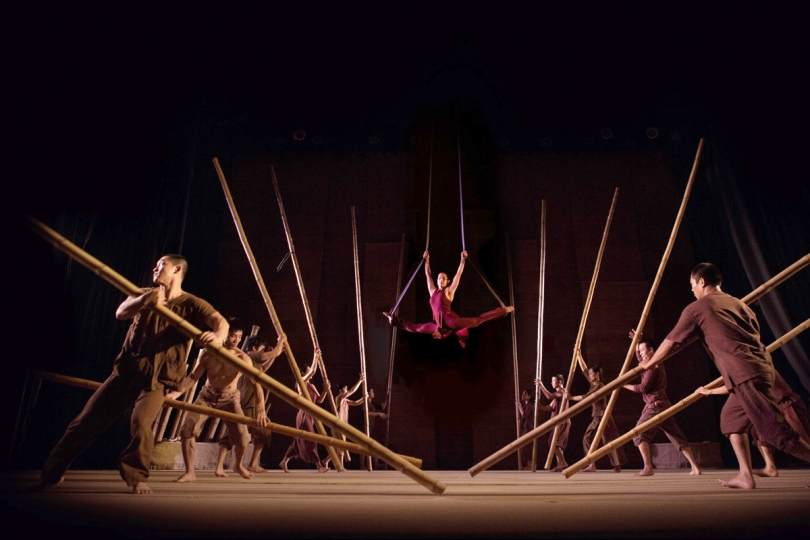All the stage is a circus

A Vietnamese-German choreographer merges acrobatics and dance
A dance cast of 20, dressed in plain farmers’ garb, intertwines towering bamboo poles in a poetic stage performance that represents the ageless rhythms of rural life in Vietnam.
The show is the work of Tuan Le, a remarkable Vietnamese choreographer who has taken his productions abroad and won attention on the global theatre circuit.
Vietnamese by birth but German in his education, Le’s intricate ballets borrow ingredients from both countries.
Contemporary-music composer Ngoc Dai, who’s well known in Vietnam for his love songs, says Le’s mixing of artistic backgrounds has been a “breakthrough” for Vietnamese high culture.
“People here have for a long time called for a renovation of art and performance, but they only speak and don’t know what to do,” he says, adding that Tuan’s artistic risk-taking had been a “vital success”.
Born in 1977 to a family in Ho Chi Minh City, two years after the end of the Vietnam War, Le was already a circus juggler by age seven.
Performance art ran in the family, he explains, with his father being a jazz musician and his mother a theatre director.
“I wouldn’t say it’s in the blood, but it’s in the family ... What I’m doing is the work of my mum, but in a different field a little bit,” says the 39-year-old ballet director, who still lives in Ho Chi Minh City but remains a legal resident of Berlin.
By age 13 Le was set to join his brother in Moscow training in a circus school. But when he arrived in 1991, just as the Soviet Union was collapsing, they decided to move to East Berlin, just ahead of Germany’s reunification.
Despite the cultural differences, Le says, he took to Germany quickly. After just six months of language instruction, his teachers said he was ready to sit in a regular German classroom.
After completing secondary school he resumed his circus education at the Berlin State School of Ballet. By 1999 he was ready to introduce his first dance, a retelling of his first impressions upon moving to Berlin.
“The story is about someone like me who comes from Vietnam, who enters Berlin and sees different things happening – jazz musicians, crazy drunk people,” he laughs. He used a clown to represent a drunk.
While Le had wholeheartedly adopted Germany, he began to think back to his childhood in Vietnam. In the age before the Internet he grew thirsty for news from his birthplace.
“I went to the library looking for books about Vietnam and sometimes on TV they’d show little reports about Vietnam. I thought maybe I should visit.”
Returning to Vietnam for a holiday, Le was inspired by trips to the countryside. He’d grown up in Vietnam’s largest city, so rural life was new to him.
“Just the environment gave me a lot of inspiration – very calm, the wind, everything else, the people here and there, and I’d talk to people, and I thought for me it was very touching,” he says.
Le has since created three ballets financed by the Vietnam-based agency Lune Production. His most famous work, “Lang Toi” (“Our Village”), premiered in 2009 at the Hanoi Opera House and uses a combination of dance and acrobatics to convey Le’s vision of the beauty of village life.
The show’s grand but minimalist set is comprised mostly of bamboo poles. The farmers rhythmically manipulate the bamboo to erect and dismantle a constantly changing structure at centre stage.
Throughout “Lang Toi” the dancers delicately walk on bamboo tightropes, balance in human towers or throw themselves through the air in stunts that derive from circus acrobatics.
With the cast mostly silent, a traditional Vietnamese band provides the accompaniment, using instruments rarely heard in Vietnam anymore.
The show has travelled around the world, including to Munich’s Tollwood Festival in 2012.
“I really hope one day that I can bring it to Berlin too to thank Germany and Berlin,” Le says.
Tuan Le’s “AO Show”, a creation that premiered in 2013 and was given a musical reboot this year with ethnic-minority influences from the Vietnamese Central Highlands, will travel to France in November for a three-month tour.
“AO Show”, which explores the collision of rural and urban life, features the same acrobatic approach to ballet and fixation on bamboo.
That signature approach, says Le, defies categorisation. “Yes, it’s circus, but it’s not only circus, and yes, it’s dance, but not only dance.”
RELATED





